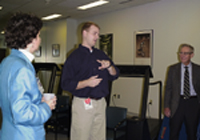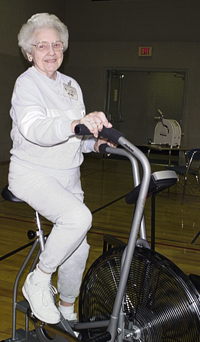
Return to Main Menu |
Cardiac
rehab program celebrates 20 years
by Cindy Abole
Public Relations
In this day of overweight, over-stressed, unhealthy Americans, hundreds
of men and women in the Lowcountry have decided to pump, cycle, row and
walk themselves toward a healthier lifestyle.
 Exercise
physiologist Mark Clair explains the fitness activities that are part of
the Heart Disease Prevention Program to Dr. Mary Frankis and Dr. William
Barnwell. All were present at a reception recognizing National Cardiac
Rehabilitation Week, Feb. 7-11. Exercise
physiologist Mark Clair explains the fitness activities that are part of
the Heart Disease Prevention Program to Dr. Mary Frankis and Dr. William
Barnwell. All were present at a reception recognizing National Cardiac
Rehabilitation Week, Feb. 7-11.
Among them are patients recovering from heart attacks, bypass surgery,
angioplasty, congestive heart failure or people threatened with cardiovascular
disease. One such group that is making great strides are patients of MUSC’s
Heart Disease Prevention Program and MUSC/The Citadel’s Cardiac Rehabilitation
Program.
In South Carolina, heart disease continues to rank as the Palmetto
State’s top killer.
In 1980, MUSC made the leap to establish the Lowcountry’s first rehabilitation
program for heart patients. Twenty years later, the program continues to
steer recovering cardiac patients towards adopting and developing a heart
healthy lifestyle through exercise, education and modification of factors
conducive to heart disease.
Coordinated by its medical director William H. Barnwell II, M.D., professor
emeritus, Department of Medicine, the program began as the Charleston Cardiac
Rehabilitation Program. It was developed as a consortium drawing support
from area institutions including MUSC, The Citadel and the College of Charleston.
The program received funding support through the S.C. State Legislature
in 1979 with the help of former U.S. Representative Tommy Hartnett of Charleston.
It was initiated at MUSC by Peter C. Gazes, M.D., then chief of cardiology,
Barnwell and W. Marcus Newberry, M.D., then dean of the College of Medicine.
“Cardiac rehabilitation offers an irreplaceable service to patients
and their physicians by providing education to the patient and their family
with frequent reinforcement,” said Barnwell. “The program furnishes supervised
exercise in a group setting and provides psychological support for the
patient by the staff and fellow participants.”
The program boasts a multi-disciplined team approach drawing upon the
expertise of exercise physiologists, physical therapists, dieticians, psychologists,
social workers, pharmacists and vocational rehabilitation counselors to
teach and supervise patients. Organized in four phases, the program goals
are to help patients return to their functional abilities, identify and
modify coronary risk factor behaviors, improve physiological and social
goals and reduce risks for recurrence.
In January 1980, the program began with a pilot group of five patients
and five specialists operating out of The Citadel’s physical education
complex. Participants were supervised as they participated in education
classes and performed stretching, light calisthenics, walking, bicycling
and range-of-motion exercises to improve their physical fitness.
Last May, part of the program moved to a new facility at the Gazes
Cardiac Research Institute. Located on the MUSC campus, the facility offers
patient diagnosis, recovery services, nutritional education and monitored
exercise programs. Specialists also teach classes focusing on risk factor
interventions like weight management, hypertension, smoking and lipid management,
according to co-director Michelle Hendley, clinical nurse specialist for
the program. Hendley also works with Mary B. Frankis, M.D., associate professor
of Medicine and co-medical director for the program. Access into MUSC’s
program is by physician-referral.
Early stage recovery patients are visited by rehab nurses in the hospital
who evaluate and provide education materials for the patient. As a patient
is discharged and continues to recover, they enter the second stage of
cardiac rehabilitation—a formal exercise program that closely monitors
an individual’s progress using telemetry to monitor the cardiac rhythm.
This is omitted during Phase III of the program.
As patients graduate to Phase IV, they continue with their exercise
routines at The Citadel’s facilities under the supervision of co-program
director Col. Melvin H. Ezell Jr., Ph.D., an exercise physiologist who
has been with the program since its inception. An adult fitness program
for primary prevention of non-cardiac patients was established in 1982.
The Citadel’s program also acts as a learning lab for interdisciplinary
students at MUSC and The Citadel. Medical, physical therapy, nursing students
and health education students are able to complete their rehabilitation
studies and rotations by observing and logging in volunteer hours to meet
course requirements.
The Cardiac Rehabilitation Program was modeled after successful hospital
programs in North Carolina. Barnwell worked with Dan Young, M.D., at the
University of North Carolina-Chapel Hill. He also consulted with Henry
Miller, M.D., and Paul Ribisl, Ph.D., at Wake Forest’s Bowman Gray School
of Medicine and William Webster, Ph.D., at Greenville General Hospital.
In 1985, South Carolina became the third state, behind North Carolina
and California, to establish guidelines and set standards for certified
state cardiac rehabilitation programs. National standards for these programs
were not developed until 1991 by the American Association of Cardiovascular
and Pulmonary Rehabilitation.
Today, MUSC is one of three certified programs in the tri-county area.
It is among 38 statewide cardiac rehabilitation programs that have been
certified by a joint committee on cardiac rehab from the South Carolina
Medical Association (SCMA) and the S.C. Heart Association (SCHA). In 1990,
statewide programs organized to create the S.C. Cardiopulmonary Rehabilitation
Association (SCCPRA).
“South Carolina has one of the most consistently-run cardiac rehab
programs in the country,” said Gary Piper, M.Ed., program director, Cardiac
Rehab Program at Roper Hospital and chairman of the Cardiac Rehab SCMA/SCHA
joint committee. Piper is proud of the fact that South Carolinians
now can access a certified cardiac rehabilitation clinic within a 40-mile
radius throughout the state.
Piper and other SCCPRA appointees are involved in the recertification
of programs every three years. MUSC’s program was recently recertified
in January.
“Cardiac rehabilitation in South Carolina is strengthened by good involvement
with physician’s groups like the SCMA,” Piper said. “It’s good communications
and interaction that form a foundation to good working relationships. That’s
what makes programs like these work so well.”
MUSC’s Heart Disease Prevention and Cardiac Rehabilitation
Program
Phase 1 (inpatient-hospital): Patients are introduced to an education
program and light rehabilitation exercise. Patients are physician-supervised.
Duration: daily during hospital stay.
Phase II-Early Therapeutic (outpatient-Gazes): Participation
in an education program featuring moderate exercise. Program is physician-supervised
and telemetry-monitored. Duration: 3 days per week/8-12 weeks.
Phase III-Progressive Therapeutic (outpatient-Gazes): Participation
in physician-supervised fitness program, omitting telemetry. Duration:
3 days per week/3-6 months.
Phase IV-Fitness Maintenance (outpatient-Citadel): Participation
in staff-supervised, fitness program. Duration: varies
Adult Fitness Program (outpatient-Citadel): Organized as a risk
factor intervention program. Duration: varies
86-year-old cardiac survivor inspires others
The two things 86-year-old Sybil Asaro loves is people and exercise.
 Sybil
Asaro Sybil
Asaro
“Back in my days growing up, women never exercised,” said Asaro.
A friendly and active woman, Asaro was lucky to survive a cardiac event
and two heart procedures: an angioplasty in 1986, quadruple bypass surgery
and a bilateral carotid endartectomies in 1997. Each time she was referred
to William Barnwell, M.D., and MUSC/The Citadel’s Cardiac Rehabilitation
Program.
“I just told myself that if I want to continue healing, I had to strengthen
my heart,” Asaro said. “I learned that exercising was the key.”
Her mornings begin at 5 a.m., starting with a light breakfast of oatmeal
and toast. By 6:30, Asaro checks in with staff, records her pulse rate
and begins her walks around The Citadel’s Deas Hall Gymnasium three days
a week. After completing her warm-up laps, Asaro rechecks her pulse and
returns to the floor for group calisthenics and a workout on the exercise
bikes or ergomatic rower.
But Asaro’s example extends beyond just exercising. Each morning, she
greets each workout participant with a smile and a hug.
“Sybil is usually the first person to greet a new patient before I
can get to them,” said Col. Melvin H. Ezell Jr., Ph.D., who is co-director
of the program. “It has meant so much to so many people. Her presence and
encouragement helps to break the ice and gets folks involved.”
“I’m very proud of this program because it really does work,” Asaro
said. “I don’t know a program available that takes better care of me.”
|



 Exercise
physiologist Mark Clair explains the fitness activities that are part of
the Heart Disease Prevention Program to Dr. Mary Frankis and Dr. William
Barnwell. All were present at a reception recognizing National Cardiac
Rehabilitation Week, Feb. 7-11.
Exercise
physiologist Mark Clair explains the fitness activities that are part of
the Heart Disease Prevention Program to Dr. Mary Frankis and Dr. William
Barnwell. All were present at a reception recognizing National Cardiac
Rehabilitation Week, Feb. 7-11.